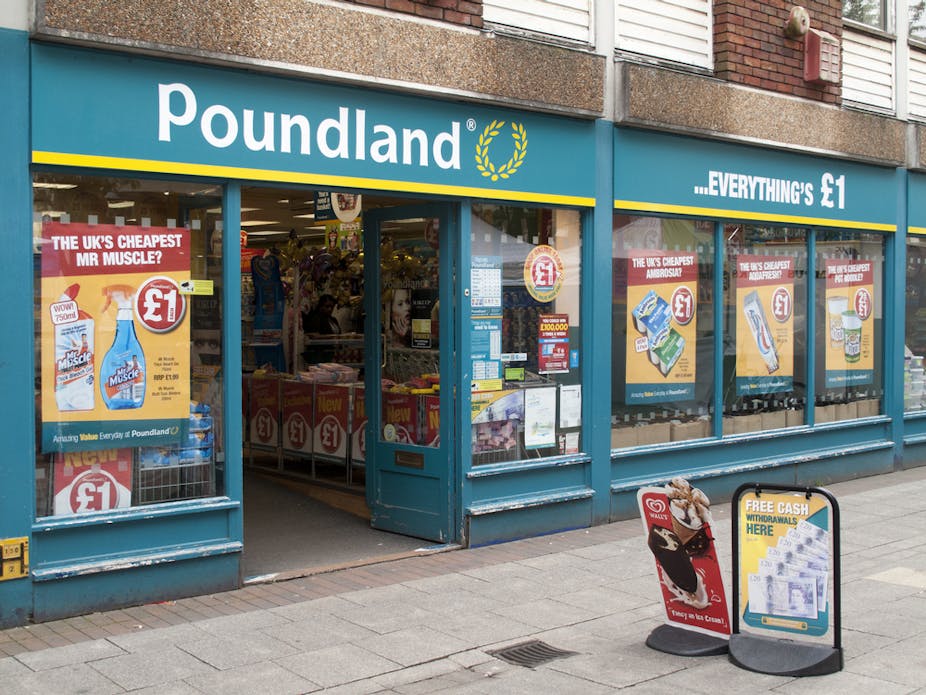Budget shops are big business. The recently approved £55m merger of low cost retailers Poundland and 99p Stores is just the latest manoeuvre in their battle to conquer our high streets.
The rise and rise of the pound store certainly is an emotive topic – just take a look at the BBC’s two series of Pound Shop Wars a fly-on-the-wall documentary which charts the competition between rival chains. While some shoppers flock to them, wallets and purses at the ready, others claim they suck the life out of our town centres.
The merger has certainly provoked strong commentary from the Independent, the Financial Times and the Telegraph all bemoaning – again – the notion that they are killing off our high streets. This generally conservative claim has been made over and over since the start of the financial crisis. But is there any truth in it?
The blame game
When it comes to the “death of our high streets” there are a number of bogeymen. Sometimes blame is levelled at the rise of e-commerce which has attracted 73% of UK consumers with an internet connection into buying goods on line at least once a month. Others point to the large number of vacant shops, greedy private landlords or poor council management.
But the problems faced by our high streets cannot readily be attributed to any one of these causes. Instead each town and city centre faces its own particular array of challenges.
Critics fear that the Poundland merger, which will create an 800-store giant, will lead to yet more empty shops and even greater Americanisation of the high street. They often nostalgically reference the demise of UK high-street icon Woolworths as a hallmark moment in the inescapable decline of our domestic retail experience. But Woolworths was, in fact, an American import that employed a “pound shop” business model, albeit a more dated, traditional and less flexible one.

The reality is that pound price point retailing is profitable, thanks to the huge turnovers generated by low prices and constantly changing stock lines. Instead of servicing specific brand desires, as most mid and late 20th-century stores attempted to do, pound shops successfully have tapped into a new desire for thriftiness by offering low prices and the ready supply of goods that approximately meet consumer needs. Aldi and Lidl are part of this consumer movement, which is leading many shoppers away from both middle-of-the-road brands and the prices offered by brand-name high-street retailers.
Charity shops and pawnbrokers also figure noticeably in the new high-street environment in ways that capture the austerity agenda and reflect social movements that encourage recycling, reuse and the reinvention of retro tastes and fashions. Betting shops, the other now-familiar commercial presence on austerity Britain’s high streets, add a measured dose of risk, hope and financial opportunity to urban retail.
This new retail landscape partly is built on the fall-out of the financial crisis but it is also linked to a growing rejection of conspicuous brand consumerism. Hard economic times have brought about and enforced the realisation of Naomi Klein’s No Logo philosophy on the physical high street. Meanwhile, high-prestige brands have retreated to the remaining pockets of international consumer excess, such as upmarket shopping malls and exclusive inner-city strees and the targeted marketing opportunities of e-commerce.
High-street evolution
The positives of this new retail landscape are often overlooked. Pound stores, Lidl, Aldi, charity shops and pawnbrokers, as well as the other remainder chains such as TK Maxx, offer consumers the opportunity to indulge in “discovery shopping”. Discovery shopping brings a new element to the high-street retail experience by encouraging consumers to explore for the “types” of items they want without the prejudice of requiring or seeking out a specific brand.
Discovery shopping brings entertainment to the high-street retail experience, a positive that can help counteract the mundane burdens of high car parking prices and congested roads. Combine the excitement of discovery with the £1 price tags and the result is that pound shops are offering a mix of entertainment and value that existing e-commerce, burdened by fixed stock lists and the additional costs of delivery and scheduling logistics, has so far been unable to provide.
The high street has always been a commercial proposition. The businesses that succeed are those that best meet the needs of consumers. It has always been this way. We may get nostalgic about our high streets, but they have always evolved to suit the majority of consumer needs. On the high street, change really is good.

